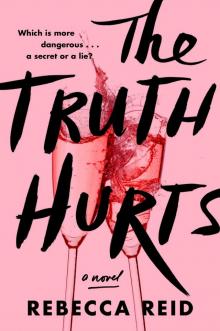- Home
- Rebecca Reid
The Truth Hurts Page 8
The Truth Hurts Read online
Page 8
“What is it?” she asked, knowing the answer. Drew didn’t reply, he just gestured at her to open it. So she did. And sitting in the box was a ring. A fat round diamond with two smaller diamonds either side of it, on a warm gold band. She picked it up, marveling at it.
“I didn’t think a sign for the house was very exciting on its own,” said Drew.
Poppy slid it onto her finger, still speechless, and held her hand up to the light. It sat on top of the simple gold band she’d chosen for their wedding, rudely beautiful in the light.
“I didn’t think it was fair that you missed out on the engagement ring, even if we weren’t ever really engaged.” Drew ran his hands around her waist, down her hips and into the back pockets of her jeans. “You look even more beautiful in England than you did on Ibiza,” he said.
Poppy shook her head, trying to dislodge the shards of worry that had worked their way in. She looked down at her hand. It was beautiful. The most beautiful piece of jewelry that she had ever seen in her life.
“I love it,” she said truthfully. “And I love you.”
It wasn’t the first time she had said it. She’d whispered it back to him when he’d told her weeks ago. But it was the first time that she had known without any doubt that it was true.
Before
Late afternoon was Caroline’s favorite part of the day. Homework was done, shoes were by the front door ready for school and a brief sense of calm descended before the bedtime rush of baths and stories. She felt no guilt about letting the girls watch TV while Jack messed around on his phone so that she could get supper ready in the kitchen. It was her little half-hour respite, between five thirty and six, to cook and clean and stand in the warm yellow kitchen, listening to the radio and not to anyone. So, when the kitchen door opened, she steeled herself to tell whoever it was to bugger off and leave her be. But it was Agnes.
“Can I help?” she asked.
“No, no, it’s fine. You’ve had them all afternoon. Why don’t you go and relax for a bit?”
She looked crestfallen. Something shifted inside Caroline. The more she got to know Agnes the younger she seemed. “Or you can come and sit with me while I sort supper out?”
Agnes took a seat at the breakfast bar, her fingers dancing over the marble worktop.
“Can I ask something?” she said eventually, her eyes firmly planted on the floor. She wrapped a strand of hair around her finger.
Knowing from previous experience with Jack that these conversations were much less painful with a focus, Caroline took a bag of potatoes out of the vegetable rack. “Of course you can,” she said. “Give me a hand with these?”
Agnes seemed relieved.
“So, what was the question?”
“When Ella got upset earlier . . .”
“Threw a tantrum.”
Agnes smiled. “Yes. That.”
“What about it?”
“What do you do when she gets like that?”
Caroline sat down at the breakfast bar. “You don’t need to worry about that stuff—disciplining them. If they’re playing up you tell Jim or me and we’ll sort it out.”
“I know.” Agnes’s neck was red. “I was wondering what you guys do, though.”
Why was she asking this? Something about her question felt uneasy, but Caroline sensed it was important, and costing her a great deal to ask. “Well, it depends really. If she’s really upset I’ll try to talk to her about what’s going on. Otherwise, if she’s just pushing the boundaries to see what she can get away with then I’ll put her on a time-out. When they’re older, like Jack, it’s more about taking away privileges like screen time or pocket money.”
“You don’t hit them?”
Caroline sat up, her muscles tensing. “No, we don’t ever hit them. You haven’t—”
“No, no, I wouldn’t, I haven’t—” Agnes sounded horrified. Relief flooded Caroline. She realized that she had never said that. She had never expressly forbidden any of her nannies to hit her children, just assuming they knew that in this day and age it was impossible.
“Is that—” Agnes stopped. She was clearly trying to seem offhand, casual. “Is that normal, not hitting them?”
Something about her tone made Caroline sure that these were questions she had been working her way up to asking. “I think so,” Caroline said, trying to be measured. “Maybe when Jim and I were kids some parents did. But surely by the time you were a child parents weren’t still—” She stopped, noticing that the potato Agnes had been peeling had slipped out of her hand. “Did your parents?”
“Mum,” she said. “My dad left when I was little. We don’t see him anymore.”
“Did your mum hit you?”
Agnes nodded.
“Often?”
She nodded again.
“Darling, I’m not sure that sounds quite right. Maybe you should talk to her about it? She was on her own, had two of you. Sounds like she was under a lot of stress. She might have done things she’s not proud of . . .”
“Mum is quite old-fashioned,” Agnes replied, her eyes cast down. She looked nervous, as if she thought her mother might be able to hear her.
“Oh?”
“Catholic.”
Caroline sensed that she needed to change the subject for the moment, leaving the door open to come back to it. “Ah. Hence Agnes.”
She nodded again. “I was born on St. Agnes’ Day. I wish I could have been born any other day of the year. Everyone at my school laughed at it.”
“You don’t like your name?”
She raised one eyebrow. “Do you?”
Caroline wasn’t sure what to say. No, she didn’t like it. It was heavy and old-fashioned and didn’t suit this sweet, lost young woman. “Jim uses his middle name instead,” she volunteered, avoiding the question.
“Really? What’s his first name?”
“Steven.”
“He doesn’t seem like a Steven.”
“No,” Caroline agreed. “When we met at university he was going by Jim; his middle name is James. And it stuck.”
Agnes finished peeling the potatoes and took the pan to the sink, filling it with water. “Could I do that?”
“I don’t see why not. What’s your middle name?”
“Poppy.”
Caroline smiled. “Well, that’s much better. Suits you down to the ground.”
“I can really do that? Just start using it?”
“Yep.”
“I don’t think that my mum would like that.”
“Well,” Caroline said, knowing that she was stepping over an invisible motherly line that should have remained uncrossed. “You’re an adult. You don’t have to ask her, or tell her. You can just do it.”
Chapter 11
A week after they moved into Thursday House, Poppy sat on the bed in the master bedroom, painting her toenails. She lay back against the mass of pillows, wiggling her toes and admiring her handiwork. It was a bright orange color called Hopeful Harlot. She’d seen it on their trip to Bath that morning. She’d almost put it back when the register had displayed the price, twenty-seven pounds, but Drew had just swiped a card over the reader and they’d carried on toward lunch at a restaurant on a rooftop.
A noise caught her ear. She screwed the lid back onto the bottle, as if stopping what she was doing would enable her to hear better, and pulled open the bedroom door. Music, unquestionably music. Pretty, watery notes filling the house. She wandered down the stairs, watching her feet hit each step, and followed the sound, finding her way to the drawing room, the huge yellow and green room at the front of the house. It was one of Poppy’s favorites. The uncomfortable, formal furniture favored by whoever had lived here before worked in here in a way that it just didn’t in the smaller rooms.
She stopped in the door frame. The piano—a huge mahogany thing that she’d given little thought to—had been under a dust sheet when they arrived. Now Drew sat with his back to her, drawing his fingers across the piano keys, appa
rently without effort. Was it like that for everything he did? Did he ever have to try? He’d picked up a wife and a house in a matter of months, things most people spent years doing. Maybe that was how it worked for him.
“Jesus Christ,” she heard herself say.
Drew stopped and looked up. “Not a fan of Debussy?”
“You don’t see it, do you?” The words came out heavier than she wanted them to. Clunky.
“What?”
“Your whole life is like the picture that comes free with the photo frame. Just, you know. Perfect. And you’ve simply dropped me in the middle of it. I don’t get it.”
Drew extended an arm toward her. She sat down next to him on the piano stool, trying to take up as little space as possible.
“I’m not perfect. No one is perfect. I promise you, I’ve made all sorts of fuck-ups. But is it really such a bad thing that we’ve got a nice house? A nice life?”
“It’s not bad, it’s just . . . a lot.”
Drew laughed and pulled her toward him. “I know.”
She leaned into him, feeling the warmth of his skin through his shirt.
“I need to talk to you about something,” said Drew, pulling the wooden lid over the keys.
Poppy felt her muscles tighten. “Oh?”
“It’s nothing bad,” he countered. “Come with me?”
Poppy followed behind him, eyes focused on the back of his head, telling herself that it wouldn’t always be like this, that she would learn to relax. They’d only been married a month and a half. Known each other less than three.
“This is going to be an awkward conversation,” said Drew as they reached the study. He stood behind the desk, which sat like a leather-topped island between them. She felt a pricking under her arms, like she was starting to sweat. What was he about to say?
“Oh?” she said, forcing her face to stay neutral.
Drew took an envelope out of his desk drawer and passed it over to her. A thick white one with a window. The kind of letter that banks and businesses sent.
What had he found out? She could hear the blood thumping in her head.
“What is it?”
“Open it.”
So she did. And out came three little plastic rectangles with A P SPENCER written on them.
“Credit cards?” she said, the hammering of her heart slowing as her eyebrows knitted together in confusion.
Drew stood up, taking the cards from her and laying them on the desk. He pointed at the first one. It was granite-colored. “Credit card. You use that for any major purchases, say anything over a few thousand pounds. The limit is thirty thousand.”
Poppy put her head to one side. “What the fuck?”
Drew put his hands up. “I told you. Awkward conversation. Just hear me out, OK?”
“OK.”
“I’ll be back at work next week, so stands to reason that you need money to do whatever you want—decorate the house, see friends, go into town, whatever. So, the credit card is for major purchases, anything over a few grand goes on there. This one”—he pointed at the green one—“is your debit card. It comes out of our main account. That’s for everyday stuff, getting cash out, petrol, food shopping, that sort of stuff. There’s about three hundred thousand pounds in there at the moment.”
Poppy nodded, her eyes wide. “And that one?” She pointed to the gold one.
“That’s your private account.”
“I already have a private account.”
“I know, and you should keep that one. But I thought it might be nice for you to have access to some private money, away from the joint accounts. Not that I’ll be checking up on you, but if you want to do something private or treat a friend or anything like that, that’s what that account is for. I’ve put some money in there, ten grand, and if you want more you can transfer it over from our joint debit account. There’s a list of passwords in the envelope, which I’m told is a deeply unsafe thing to do, so best if you don’t lose it.”
Poppy picked up the cards. “Should I give you some big soul-searching speech about how I can’t possibly take this because I haven’t earned it and it’s not mine?”
Drew laughed. “You can if you want. But you know how I feel about this. It’s our money. So it’s not worth it. And,” he went on, seeming emboldened by her response, “I thought it might be worth paying off any existing debt.”
“Debt?”
“Yes, Poppy, debt. It’s when you owe someone money and they charge you interest,” he teased.
“I know what debt is, you nob.”
“Good. So I’ll put you in touch with James Griffiths. He handles my finances—our finances—and he’ll talk you through the process of getting rid of anything like student loans or overdrafts.”
She shook her head. There was an odd sort of lightness inside the cavity of her chest. The idea that there would be no more red-stamped letters, no more panic-inducing phone calls from unknown numbers.
She felt her face lifting into a huge smile, one that she had no control over. “Why are you doing this?”
“Because there’s no point you accumulating interest on loans that could easily be paid off, and it’s better for your credit rating to start using . . .” He paused. “Oh. You mean this?” He gestured between the two of them. “You really don’t see it, do you?”
Poppy put her head to one side. “What you see in me? No. I can’t say I do, really. I mean, I know I’m young, and the sex is good . . .”
Drew laughed. “Do you want the speech?”
“The speech?”
“About all the reasons I fell in love with you and why I’m never letting you go?”
She shook her head. Maybe she did want it. But not now. Not after he’d just given her so much. She smiled. “I know it’s the sex stuff.”
“Yes.” He laughed. “It’s the sex stuff.”
She stretched up to kiss him. “Do you know where the best place to shop for a private jet is?”
“Oh, it’s always more efficient to rent planes than to buy them,” started Drew. He caught sight of her expression and laughed again. “God,” he said. “Before I met you, I swear I only laughed once or twice a year.”
Poppy rested her head on his chest. “I think technically that was a comment about the past,” she teased.
“You’re quite right,” he said. “My mistake.”
Before
“I think we should ask Poppy to join us for the party tonight,” Caroline told Jim as she chopped garlic.
“Really?” asked Jim.
“You don’t think so?”
“Well.” Jim straightened up from where he’d been playing fridge Tetris, trying to make the huge weekly shopping fit. “She’s probably got plans.”
Caroline shook her head. “No, I asked her yesterday. She’s in tonight. I hate the idea of her sitting in her room on her own while we’re all down here.”
“Is it strange that she doesn’t have a social life of her own?”
Scraping the knife along the board, Caroline swept the garlic onto the raw chicken, which would soon look delicious but right now was a little stomach-turning. “She does, but her friends are all either traveling or doing high-powered internships. She goes for drinks with them after work sometimes.”
“Shouldn’t she be doing that? Interning or something?”
“With what money?”
“Money?”
“Her parents don’t live in London, Jim. Internships don’t pay.”
“All right, all right.” He put his hands up, as if she was holding a gun at him. “Why are you so defensive of her?”
Caroline snorted. “I’m not. It’s just . . .” She trailed off, hoping he might interject with something. Prove he knew her at least a little better than she thought he did.
Jim hated this game; she knew that. Any attempt to encourage him to reach a conclusion on his own rather than having it explained to him was dubbed “playing games”—something Jim maintained that he never did.
He let out a long sigh. Was this going to trigger a low? She’d never known anyone who was subsumed by misery like Jim was. Of course, she would never call it sulking, not to his face. She felt guilty for thinking it, tried to chase up some sympathy from the recesses of her mind. But sometimes, when his dark moods meant she had to do everything for him, the kids and herself, it was hard to find. In the old days, before they had kids, he could go days without getting out of bed if he was in one of his bad patches.
He’d been better since they’d had kids, making a superhuman effort some of the time. But starting any kind of fight was a risk—he could flip into a bad place at the drop of a hat. It might not last as long as it had when he was younger, but she still couldn’t risk it, not when they were about to have friends over. And anyway, these good periods were precious. She didn’t want to waste time arguing when they had already lost so many days to his misery.
“I feel protective of her, all right?” she explained, putting the chopping board in the dishwasher. Poppy always washed it by hand, so that the wood didn’t warp in the hot water, but Caroline thought life was too short. You could buy another chopping board, but there was no money in the world that would bring back the wasted seconds that trickled down the drain with the garlicky water. “She clearly doesn’t get on with her mum; her dad bailed years ago. She’s young and she’s alone in London, and I want to make sure she’s OK.”
Jim crossed the kitchen and, to Caroline’s surprise, wrapped his arms around her. “I’m sorry,” he said.
“Sorry?”
“I know I don’t always get these things. I know you wish I did.”
Caroline relaxed her body, letting her head rest on his chest. He was so comfortingly, wonderfully solid. Over six feet, with a sturdy trunk. Muscle, covered with fat but still muscle. He would swing the kids around, one on each arm, while they screamed with laughter. Sleeping next to his heavy warmth every night, knowing he was always there, silent and still, was one of the great joys of her life. She shouldn’t be so impatient with him.
“I know it’s hard for you. Thanks for trying,” Caroline said.

 The Truth Hurts
The Truth Hurts Two Wrongs
Two Wrongs Truth Hurts
Truth Hurts Perfect Liars
Perfect Liars